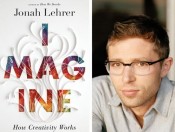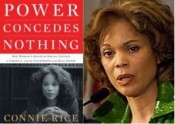Q&A: JONAH LEHRER, Author, NYT #1 Best-Seller – IMAGINE: How Creativity Works
Written on April 11th, 2012 |
Aired 04/08/12
Do you consider yourself to be creative? Do you think of creativity as a gift, a talent, something you either have or you don’t? Do you find creativity to be a bit mystical or magical, dependent on luck, the muses, or higher powers?
Today’s guest, JONAH LEHRER, has written a book in which he looks at the latest brain science and attempts, in his words, “to collapse the layers of description separating the nerve cell from the finished symphony, the cortical circuit from the successful product.”
In Imagine: How Creativity Works, Lehrer makes clear, “Creativity shouldn’t seem like something otherworldly. It shouldn’t seem like a process reserved for artists or inventors or other “creative types.” After all, he points out, the human mind has the creative impulse built into its operating system, hard-wired into its most essential programming code.” Creativity is a variety of distinct thought processes that we can all learn to use more effectively. In the book, Lehrer reveals the importance of embracing the rut, thinking like a child, and daydreaming productively. He also shows how we can use this knowledge to make our neighborhoods more vibrant, our companies more productive, and our schools more effective.
Q&A: Connie Rice – author, Power Concedes Nothing
Written on April 3rd, 2012 |
Aired 04/01/12
Too often problems are not solved, solutions are not found or implemented, and money, lives and moments of opportunity are wasted.
CONNIE RICE has taken on school and bus systems, Death Row, the states of Mississippi and California, and the LAPD – and won. Not just in court but also on the streets and in prisons, where she has spearheaded campaigns to reduce gang violence. She has long been dedicated, in her words, to finishing what Martin Luther King Jr started, and she pursues that aim with a focused passion, intelligence, and commitment.
Too often we oppose each other rather than looking for every opportunity to align to solve a problem. Rice sues a model of law enforcement that dominated Los Angeles for decades. In response, the model begins to shift. She then works with — and finally — within LA Law Enforcement. The model shifts some more. Such movement calls for the right sequence of opposition and cooperation, the strategic use of the tools available, and the ability of both sides to shift from litigation to collaboration.
http://powerconcedesnothing.com
Q&A: Peter Diamandis-Abundance Ahead
Written on March 28th, 2012 |
Aired 03/25/12
Recently the annual TED conference took place in Long Beach California. I have long recommended its famous 18 minute TED talks. Check out TED.com/talks, they cover a wide range of topics including science, technology, design, business, global issues and they have recurring themes of inspiration, challenge, and optimism. Not unlike what I try to do with this radio show.
On opening day the recent conference scheduled two talks one after the other. The first by Paul Gilding entitled The Earth is Full asked questions like Have we used up all our resources? Have we filled up all the livable space on Earth? Gilding suggests we have with the possibility of devastating consequences. In a talk that’s equal parts terrifying and oddly hopeful, he says “It takes a good crisis to get us going. When we feel fear and we fear loss we are capable of quite extraordinary things.”
That talk was followed by one by today’s guest, PETER DIAMANDIS, entitled Abundance Is Our Future in which he makes the case for optimism — that we’ll invent, innovate and create ways to solve the challenges that loom over us. “I’m not saying we don’t have our set of problems — problems – climate crisis, species extinction, water and energy shortage – we surely do. But ultimately, we knock them down.”
Since the dawn of humanity, a privileged few have lived in stark contrast to the majority. Conventional wisdom says this gap cannot be closed. But, according to a new book by Diamandis and co-author Steven Kotler, it is closing-fast. In Abundance: The Future is Better Than You Think, they document how progress in artificial intelligence, robotics, infinite computing, ubiquitous broadband networks, digital manufacturing, nanomaterials, synthetic biology, and many other exponentially growing technologies will enable us to make greater gains in the next two decades than we have in the previous two hundred years. They believe we will soon have the ability to meet and exceed the basic needs of every man, woman, and child on the planet.
http://www.abundancethebook.com
Q&A: Steven Hill-10 Steps to Repair US Democracy
Written on March 20th, 2012 |
Aired 03/18/12
Among the things that most people agree are in big trouble these days are the European Union and democracy in the US. I will talk with today’s guest, STEVEN HILL, about both.
We have been hearing for two years about the trouble Europe is in. The debt crisis in Greece, Spain, Portugal, Ireland and beyond is challenging this federation of nations and economies to share the solutions to problems that have proven worst in individual countries who took greater risks than their more prudent neighbors. After Europe seemed to have fared better than the US in the early stages of this prolonged crash, what brought on this crisis? How close are they to solving it? How close are they to blowing it? What would Hill’s advice be? And what does it mean for the rest of the world and for the US in particular?
While the bad news of this Euro crisis makes headlines in the US, what has not made headlines is the good news contained in HILL’s 2010 book EUROPE’S PROMISE. I will check in with Hill about the current state of that promise.
Closer to home, HILL believes that America’s recent economic collapse was preceded by a longer-term political collapse. Even before the economic crisis, the US faced choice-less elections, out-of-control campaign spending,partisan polarization, a rigidly divided Congress, a filibuster-wild U.S. Senate, superficial debate, mindless media, a partisan Supreme Court, and paralysis in the face of new global challenges.
As the middle collapses and partisans take over, Americans’ frustration grows – witness the Tea Party and the 99%. In a brand new 2012 Election edition of his 2006 book, Steven Hill renews his 10 Steps to Repair American Democracy.
Q&A: Oran Hesterman/Fair Food; Leila Conners/Urban Roots
Written on March 18th, 2012 |
Aired 11/13/11
Some bad news:
In 2008 more than 50% of all US harvested cropland grew only two crops – corn and soybeans and more than 40% of the food calories consumed worldwide came from just three crops: wheat, corn and rice.
30% of Detroit residents receive food stamps, but 92% of Detroit’s food stamp retailers offer few or no fresh fruit or vegetables.
The average plate of food eaten in our homes or restaurants travels 1,500 miles from where the food is grown. Our food system consumes 10.3 calories of fossil fuel energy to produce 1.4 calories of food energy.”
And some good news:
There are now 8000 farm to school programs across the US. Eight years ago there were only 4. There are now 6000 farmers’ markets in the US three times as many as in 1995. 330 hospitals in the US and Canada have pledged to purchase food that is grown according to Fair Food principles.
In recent years a number of books and films have documented the dangers of our current food system, and a number of those have been featured on Free forum. Just as you can’t alter the course of climate change by simply switching to efficient light bulbs, today’s guests believe that you can’t fix the broken food system by simply growing a backyard garden. It requires redesigning our food system.
My first guest, ORAN HESTERMAN has a new book FAIR FOOD, a guide to changing not only what we eat, but how our food is grown, packaged, delivered, marketed and sold. Hesterman opens the book talking about Detroit, Michigan, an unlikely beacon of hope in the fight for fair food.
Prior to starting the Fair Food Network, where he is President & CEO, ORAN HESTERMAN was the inaugural president of Fair Food Foundation, leading their sustainable food systems programs. Before that, he researched and taught in the crop and soil sciences department at Michigan State University in East Lansing, and for more than 15 years he co-led the Integrated Farming Systems and Food and Society Programs for the W.K. Kellogg Foundation, during which time the Foundation seeded the local food systems movement with over $200 million. FAIR FOOD is his first book.
My second guest LEILA CONNERS, a founder of Tree Media in Santa Monica, is a producer of URBAN ROOTS, a documentary on the food revolution taking place in Detroit. Directed by Detroit-native Mark McInnis the film tells the powerful story of a group of dedicated Detroiters working tirelessly to fulfill their vision for locally-grown, sustainably farmed food in a city where people — as in much of the county — have found themselves cut off from real food and limited to lifeless offerings of fast food chains, mini-marts, and grocery stores stocked with processed food from thousands of miles away.
LEILA CONNERS is Founder and President of Tree Media Group. Conners is director, producer, and writer on THE 11TH HOUR, as well as the short films “Global Warning” and “Water Planet” (all with Leonardo DiCaprio). She was Associate Editor at New Perspectives Quarterly and Global Viewpoint, focusing on international politics and social issues. She is producer of URBAN ROOTS.
fairfoodbook.org, fairfoodnetwork.org, urbanrootsamerica.com, treemedia.com
